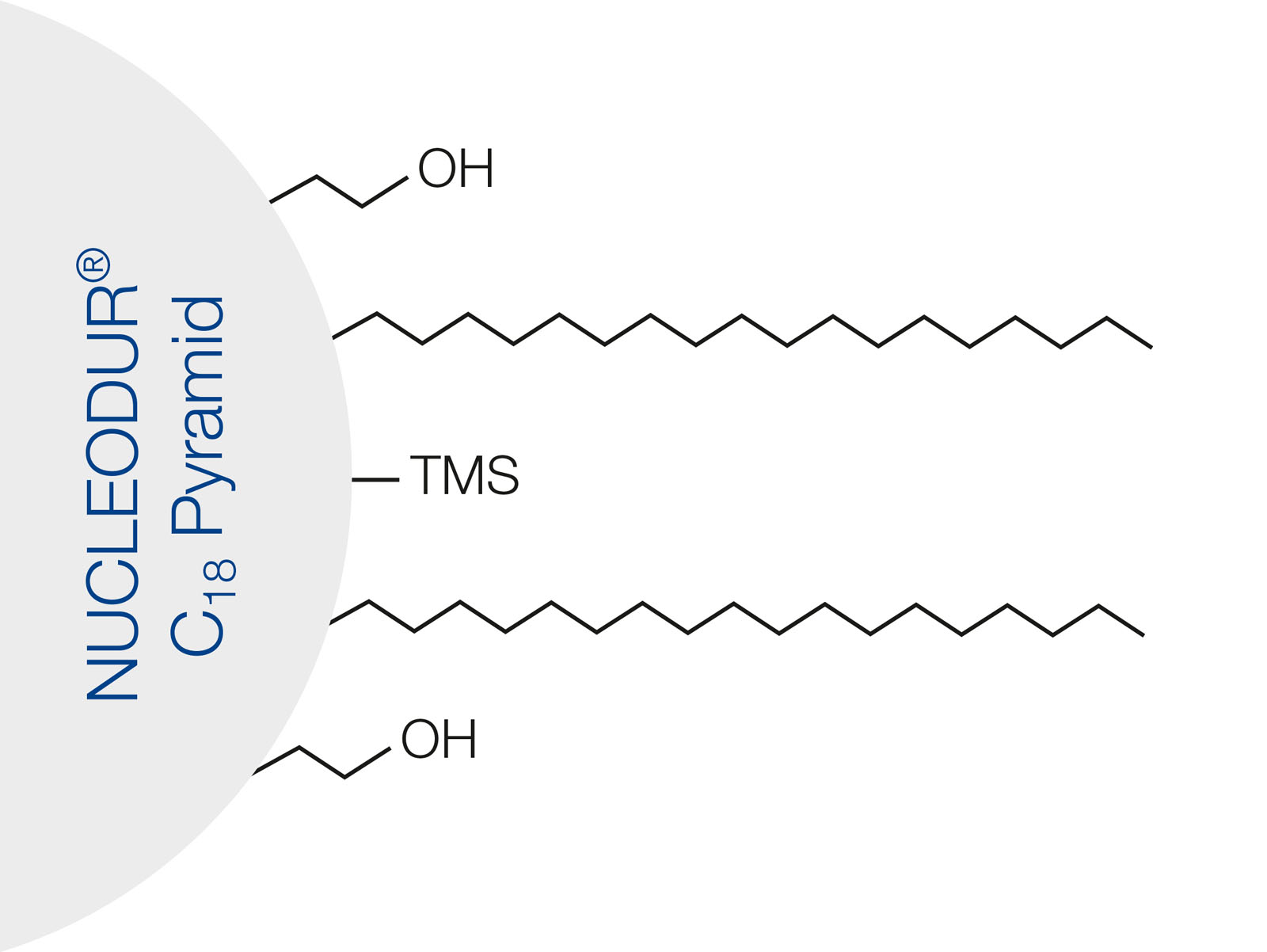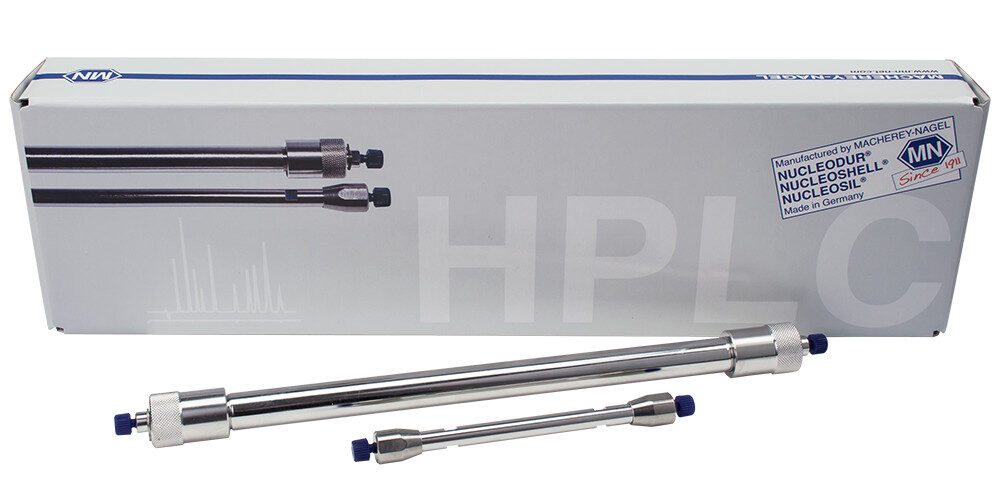NUCLEODUR® – C18 Pyramid
Phase for Highly Aqueous Eluents
- Stable in 100% aqueous mobile phase systems-USP L1
- Pore size 110 Å; particle sizes 1.8 µm, 3 µm and 5 µm; 14 % C
- 7 and 10 µm particles for preparative purposes are available on request
- Interesting polar selectivity features
- Excellent base deactivation; suitable for LC/MS due to low bleeding characteristics
- pH stability 1-9
- Classes of compounds separated so far: analgesics, penicillin antibiotics, nucleic acid bases, water-soluble vitamins, complexing agents, organic acids

RP-HPLC with Highly Aqueous Mobile Phases
The efforts to neutralize unwanted activity of unreacted surface silanol groups often creates well base-deactivated phases with high carbon load, but limited scope of selectivity beyond non-polar interactions.
Polar compounds such as carboxylic acids, and drug metabolites only show weak retention on densely bonded reversed-phase columns from distinct hydrophobic properties but low polar interactions.
Very polar analytes require highly aqueous mobile phases for solubility and retention.
Conventional reversed-phase columns often display stability problems in eluent systems with a high percentage of water (> 95%) as evidenced by a sudden decrease of retention time and overall poor reproducibility.
This phenomenon is described as phase collapse caused by the mobile phase expelled from the pores due to the fact, that hydrophobic RP phases are incompletely wetted with the mobile phase.
Different approaches can be used to increase column stability with highly aqueous mobile phase systems. The most promising are incorporating a polar group in the hydrophobic alkyl chain, or using hydrophilic endcapping procedures to improve wettability of the reversed-phase modification.
NUCLEOSIL Nautilus may be taken as an example for the embedded polar group strategy, in which a C18 silane with a polar function is successfully linked to the silica surface.
Stability Features:
NUCLEODUR C18 Pyramid is a silica phase with hydrophilic endcapping, designed especially for use in eluent systems of up to 100% water.
Retention characteristics
The polar surface derivatization exhibits retention characteristics, which differentiate the “Pyramid” from conventional C18 stationary phases.

1.8um
| Catalog No. | Description | Price (USD) |
|---|---|---|
| 760271.20 | MN HPLC Column, Nucleodur, C18 Pyramid, 100A, 1.8um, 2x30mm |  Buy now $905.00 Buy now $905.00 |
| 760272.20 | MN HPLC Column, Nucleodur, C18 Pyramid, 100A, 1.8um, 2x50mm |  Buy now $905.00 Buy now $905.00 |
| 760275.20 | MN HPLC Column, Nucleodur, C18 Pyramid, 100A, 1.8um, 2x75mm |  Buy now $905.00 Buy now $905.00 |
| 760273.20 | MN HPLC Column, Nucleodur, C18 Pyramid, 100A, 1.8um, 2x100mm | |
| 760274.20 | MN HPLC Column, Nucleodur, C18 Pyramid, 100A, 1.8um, 2x150mm | |
| 760271.30 | MN HPLC Column, Nucleodur, C18 Pyramid, 100A, 1.8um, 3x30mm |  Buy now $905.00 Buy now $905.00 |
| 760272.30 | MN HPLC Column, Nucleodur, C18 Pyramid, 100A, 1.8um, 3x50mm |  Buy now $905.00 Buy now $905.00 |
| 760273.30 | MN HPLC Column, Nucleodur, C18 Pyramid, 100A, 1.8um, 3x100mm | |
| 760271.40 | MN HPLC Column, Nucleodur, C18 Pyramid, 100A, 1.8um, 4x30mm |  Buy now $905.00 Buy now $905.00 |
| 760272.40 | MN HPLC Column, Nucleodur, C18 Pyramid, 100A, 1.8um, 4x50mm |  Buy now $905.00 Buy now $905.00 |
| 760273.40 | MN HPLC Column, Nucleodur, C18 Pyramid, 100A, 1.8um, 4x100mm | |
| 760271.46 | MN HPLC Column, Nucleodur, C18 Pyramid, 100A, 1.8um, 4.6x30mm |  Buy now $970.00 Buy now $970.00 |
| 760272.46 | MN HPLC Column, Nucleodur, C18 Pyramid, 100A, 1.8um, 4.6x50mm |  Buy now $970.00 Buy now $970.00 |
| 760273.46 | MN HPLC Column, Nucleodur, C18 Pyramid, 100A, 1.8um, 4.6x100mm |
3um
| Catalog No. | Description | Price (USD) |
|---|---|---|
| 760263.20 | MN HPLC Column, Nucleodur C18 Pyramid, 100A, 3um, 2x50mm |  Buy now $905.00 Buy now $905.00 |
| 760261.20 | MN HPLC Column, Nucleodur C18 Pyramid, 100A, 3um, 2x150mm | |
| 760262.20 | MN HPLC Column, Nucleodur C18 Pyramid, 100A, 3um, 2x250mm | |
| 760263.30 | MN HPLC Column, Nucleodur C18 Pyramid, 100A, 3um, 3x50mm |  Buy now $905.00 Buy now $905.00 |
| 760261.30 | MN HPLC Column, Nucleodur C18 Pyramid, 100A, 3um, 3x150mm | |
| 760262.30 | MN HPLC Column, Nucleodur C18 Pyramid, 100A, 3um, 3x250mm | |
| 760263.40 | MN HPLC Column, Nucleodur C18 Pyramid, 100A, 3um, 4x50mm |  Buy now $905.00 Buy now $905.00 |
| 760261.40 | MN HPLC Column, Nucleodur C18 Pyramid, 100A, 3um, 4x150mm | |
| 760262.40 | MN HPLC Column, Nucleodur C18 Pyramid, 100A, 3um, 4x250mm | |
| 760263.46 | MN HPLC Column, Nucleodur C18 Pyramid, 100A, 3um, 4.6x50mm |  Buy now $970.00 Buy now $970.00 |
| 760261.46 | MN HPLC Column, Nucleodur C18 Pyramid, 100A, 3um, 4.6x150mm | |
| 760262.46 | MN HPLC Column, Nucleodur C18 Pyramid, 100A, 3um, 4.6x250mm |
5um
| Catalog No. | Description | Price (USD) |
|---|---|---|
| 760200.20 | MN HPLC Column, Nucleodur C18 Pyramid, 110A, 5um, 2x50mm |  Buy now $720.00 Buy now $720.00 |
| 760203.46 | MN HPLC Column, Nucleodur C18 Pyramid, 100A, 5um, 4.6x150mm |  Buy now $910.00 Buy now $910.00 |
| 760201.20 | MN HPLC Column, Nucleodur C18 Pyramid, 110A, 5um, 2x125mm |  Buy now $820.00 Buy now $820.00 |
| 760202.20 | MN HPLC Column, Nucleodur C18 Pyramid, 110A, 5um, 2x250mm |  Buy now $945.00 Buy now $945.00 |
| 760200.30 | MN HPLC Column, Nucleodur C18 Pyramid, 110A, 5um, 3x50mm |  Buy now $725.00 Buy now $725.00 |
| 760201.30 | MN HPLC Column, Nucleodur C18 Pyramid, 110A, 5um, 3x125mm |  Buy now $830.00 Buy now $830.00 |
| 760202.30 | MN HPLC Column, Nucleodur C18 Pyramid, 100A, 5um, 3x250mm |  Buy now $940.00 Buy now $940.00 |
| 760200.40 | MN HPLC Column, Nucleodur C18 Pyramid, 110A, 5um, 4x50mm |  Buy now $725.00 Buy now $725.00 |
| 760201.40 | MN HPLC Column, Nucleodur C18 Pyramid, 110A, 5um, 4x125mm |  Buy now $830.00 Buy now $830.00 |
| 760202.40 | MN HPLC Column, Nucleodur C18 Pyramid, 100A, 5um, 4x250mm |  Buy now $940.00 Buy now $940.00 |
| 760200.46 | MN HPLC Column, Nucleodur C18 Pyramid, 110A, 5um, 4.6x50mm |  Buy now $785.00 Buy now $785.00 |
| 760201.46 | MN HPLC Column, Nucleodur C18 Pyramid, 110A, 5um, 4.6x125mm |  Buy now $910.00 Buy now $910.00 |
| 760202.46 | MN HPLC Column, Nucleodur C18 Pyramid, 100A, 5um, 4.6x250mm |  Buy now $995.00 Buy now $995.00 |
Guard Columns
| Catalog No. | Description | Price (USD) |
|---|---|---|
| 761915.20 | MN HPLC Guard Cartridges, Nucleodur C18 Pyramid, 1.8um, 2x4mm, 3/pk |  Buy now $197.00 Buy now $197.00 |
| 761915.30 | MN HPLC Guard Cartridges, Nucleodur C18 Pyramid, 1.8um, 3x4mm, 3/pk |  Buy now $197.00 Buy now $197.00 |
| 761916.20 | MN HPLC Guard Cartridges, Nucleodur C18 Pyramid, 3um, 2x4mm, 3/pk |  Buy now $197.00 Buy now $197.00 |
| 761916.30 | MN HPLC Guard Cartridges, Nucleodur C18 Pyramid, 3um, 3x4mm, 3/pk |  Buy now $197.00 Buy now $197.00 |
| 761917.20 | MN HPLC Guard Cartridges, Nucleodur C18 Pyramid, 5um, 2x4mm, 3/pk |  Buy now $197.00 Buy now $197.00 |
| 761917.30 | MN HPLC Guard Cartridges, Nucleodur C18 Pyramid, 5um, 3x4mm, 3/pk |  Buy now $197.00 Buy now $197.00 |


